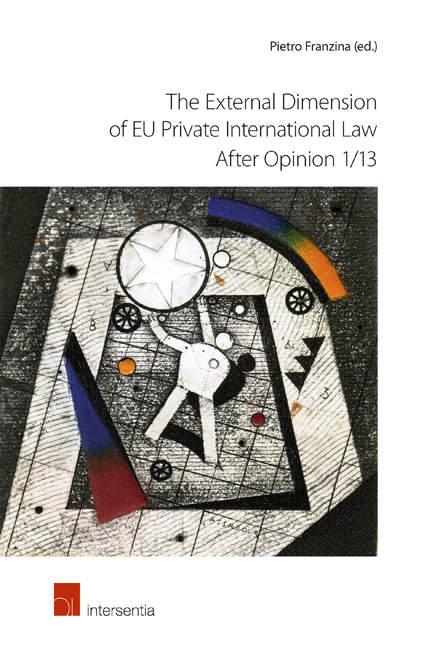Book contents
- Frontmatter
- Preface
- Contents
- PART I THE INTERNATIONAL PROJECTION OF EU PRIVATE INTERNATIONAL LAW - SOME BASIC ISSUES
- PART II OPINION 1/13 AND ITS IMPLICATIONS
- PART III THE CHANGING FEATURES OF EU EXTERNAL RELATIONS IN THE AREA OF PRIVATE INTERNATIONAL LAW
- EU External Relations and Private International Law: Multilateralism, Plurilateralism, Bilateralism, or Unilateralism?
- EU Cooperation in Civil Matters and Multilevel Unification of Private International Law: Some Remarks
- The Lugano Model - Cooperative Enhancement Over Enhanced Cooperation
- Regulations (EC) Nos 662/2009 and 664/2009: Can Exclusivity Be Successfully Reconciled with Flexibility?
- PART IV EU LEGISLATION ON PRIVATE INTERNATIONAL LAW AND EXTRA-EUROPEAN SITUATIONS
EU Cooperation in Civil Matters and Multilevel Unification of Private International Law: Some Remarks
from PART III - THE CHANGING FEATURES OF EU EXTERNAL RELATIONS IN THE AREA OF PRIVATE INTERNATIONAL LAW
Published online by Cambridge University Press: 15 December 2017
- Frontmatter
- Preface
- Contents
- PART I THE INTERNATIONAL PROJECTION OF EU PRIVATE INTERNATIONAL LAW - SOME BASIC ISSUES
- PART II OPINION 1/13 AND ITS IMPLICATIONS
- PART III THE CHANGING FEATURES OF EU EXTERNAL RELATIONS IN THE AREA OF PRIVATE INTERNATIONAL LAW
- EU External Relations and Private International Law: Multilateralism, Plurilateralism, Bilateralism, or Unilateralism?
- EU Cooperation in Civil Matters and Multilevel Unification of Private International Law: Some Remarks
- The Lugano Model - Cooperative Enhancement Over Enhanced Cooperation
- Regulations (EC) Nos 662/2009 and 664/2009: Can Exclusivity Be Successfully Reconciled with Flexibility?
- PART IV EU LEGISLATION ON PRIVATE INTERNATIONAL LAW AND EXTRA-EUROPEAN SITUATIONS
Summary
THE MULTILEVEL UNIFICATION OF PRIVATE INTERNATIONAL LAW
The movement towards the unification of private international law, to which many European countries have participated from the outset, aspired to be conducted at a universal level. The Conventions adopted in the first sessions of the Hague Conference of Private International Law in 1902 in 1905, as well as the instruments drafted under the auspices of the League of Nations and based on the work of Unidroit, were not restricted to a specific region. Also, the association established in 1929, which would later be transformed into the International Commission on Civil Status, was not, in the intention of its funders, limited to European States. It is only with the adoption of the 1968 Brussels Convention and of the 1980 Rome Convention that the phenomenon of unification of private international law at a European level becomes relevant.
However, the work of unification undertaken in the mentioned fora was, at least in its first years, perceived as Eurocentric. The organizations were born in Europe or were located in European cities and had mostly, though not solely, European membership; moreover, their activity was strongly influenced by the European legal tradition. As a result, the instruments were ratified almost exclusively by European States.
More recently, though, this state of affairs had an important enhancement and quite a few of the instruments have been ratified by numerous States of other regions of the world. Worth mentioning are some striking figures concerning instruments adopted by the Hague Conference: 112 countries are parties of the 1961 Convention abolishing the requirement of legalisation for foreign public documents (Apostille Convention); 94 States are bound by the 1980 Convention on the civil aspects of international child abduction, 96 by the 1993 Convention on protection of children and co-operation in respect of intercountry adoption, and 44 by the 1996 Convention on jurisdiction, applicable law, recognition, enforcement and co-operation in respect of parental responsibility and measures for the protection of children.
- Type
- Chapter
- Information
- Publisher: IntersentiaPrint publication year: 2016



